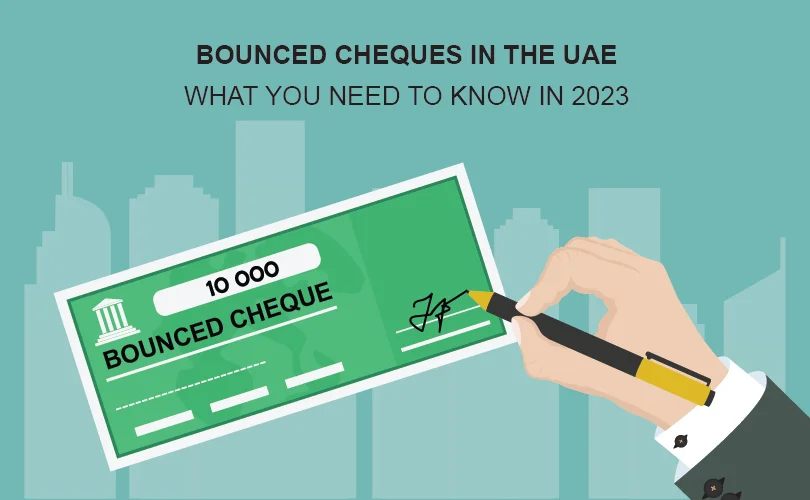
In the UAE, there are 8.89 million expats. That equates to around 89% of the population, with the majority of them renting. As a result, the popular method of payment via post-dated cheques is a hot topic.
When it comes to tenancies, the most frequent payment method is post-dated cheques (PDCs), which allows renters and landlords to proceed with minimal work or problem. Unless the annual rent is paid in cash or in one cheque, landlords typically collect the entire year’s rent in multiple payments.
For tenants, this essentially allows them to pay the entire amount of rent in advance without technically releasing the funds until the day specified on the cheque.
New UAE Law Against Bounced Cheques
The UAE courts have observed that not all reasons for bounced cheques should be criminalized or characterised as criminal activity. This motivated UAE lawmakers to intervene and make changes that would reflect this observation. Thus, the law was amended, and a series of changes were introduced until reaching the recent shape of the regulations that deal with cheques. Under the new law, the punishment for a bounced cheque is no longer included in the Penal Code, as the punishment has been moved to the Commercial Transaction Law.
According to the UAE courts, not all grounds for bounced checks should be criminalised or classified as criminal activity. This prompted UAE lawmakers to intervene and implement amendments to reflect this observation. As a result, the law was revised, and a succession of revisions were implemented until the current form of the rules dealing with cheques was reached. The penalty for a bounced cheque is no longer contained in the Penal Code under the new law, but has been moved to the Commercial Transaction Law.
However, penalty for a bounced cheque remains under the Commercial Transaction Law for criteria set by the legislator, none of which involve bouncing the cheque for insufficient funds, which was once the most common reason for cheque bouncing but is no longer criminalised.
Furthermore, a cheque that fails due to inadequate cash is considered an executive deed. In other words, the holder of a bounced cheque due to insufficient funds can approach the execution court directly, without having to file a case, to claim the unpaid value of the cheque, whether it is part or all of it, and can immediately initiate the enforcement procedure against the cheque’s issuer to recover its unpaid value.
In addition to the Commercial Transactions Law, the Decree-Law had also repealed articles 401, 402, and 403 of Federal Law No. (3) of 1987 Promulgating the Penal Code, decriminalizing the act of issuing a cheque without balance. Nonetheless, the decriminalization of cheques without balance excludes four cases that are still considered a crime, and these are:
- The crime of forging cheques
- Cheque fraud by giving an order to the bank not to cash the check illegally
- Withdrawing the entire balance before the date of issuance of the check
- Intentionally complicating the drafting of the check, or deliberately signing it in a way that prevents its cashing
Bounced Cheques Before the Amendment
Under UAE law, a bounced cheque was a criminal crime. According to the now-defunct Article (401) of the UAE Penal Code, cases of dishonoured cheques – for whatever reason — were punishable by incarceration or fines.
While it was still in effect, it was a common scenario in Dubai’s leasing landscape:
If a tenant’s cheque is returned unpaid, a landlord may file a criminal complaint with the local police station. Following that, the police may summon the drawer of the bounced cheque, in this example the tenant, and provide him or her the choice to settle the amount. Otherwise, the case could be brought to court.
If the settlement is not reached, the police may file a complaint against the tenant and refer it to the public prosecutor or criminal court. This is the stage at which criminal culpability is established and a fine or detention is imposed.
At least, such was the case in the past.
Bounced Cheques After the Amendment
- The laws were amended in early 2022 to make issuing a cheque with insufficient money a civil violation. Furthermore, the amendments make partial payment of a cheque essential.
- The new rules are intended to promote amicable resolutions between parties, including landlords and tenants. Finally, it redefines what constitutes a crime in business transactions involving returned cheques, while also decongesting the UAE’s court system.
- This indicates that the preceding processes of filing a police report and the subsequent procedures are no longer necessary. Instead, a cheque bearer can deliver a returned cheque directly to request an executory order for payment of the entire or remaining value in question.
- Banks are required to disburse any available monies in the drawer’s account for the benefit of the cheque bearer unless the beneficiary declines the partial payment.
- It is vital to emphasise that cases involving fraud can still be pursued criminally. These are cases involving forgeries, falsifications, and fraudulent practises to prevent cheque encashment.
Have All Bounced Cheque Cases Been Decriminalized?
In November 2021, the UAE modified the Commercial Transaction Law. The amendment’s focus was the decriminalisation of bounced checks. The law went into effect on February 2, 2022. It is consistent with the government’s strategic strategy and endeavours to implement international practises in order to create a sustainable economy.
President His Highness Sheikh Khalifa bin Zayed Al Nahyan released Federal Decree-Law No. (14) of 2020 Amending Certain Provisions of Federal Law No. (18) of 1993 Concerning Commercial Transaction Law on September 27, 2020. The legislation is complex and covers a wide range of commercial transactions in the UAE. The main takeaway for businesses and people is that some occurrences of bounced checks are no longer criminalised.
The question now is what will happen to the continuing cheque bounce cases in the UAE. Will they gain from this change? Except in circumstances of forgery or cheques written in bad faith, this modification does not give rise to criminal proceedings. Other emirates, besides Dubai, have yet to issue a declaration. The Dubai government released Circular No. 9 of 2021 to close all pending instances involving failed cheques. The circular was addressed to police and public prosecutors. Several people who had cheque bounce complaints recorded on them were relieved by the circular. The Dubai government also asked citizens to go to the police station or public prosecutor’s office and formally request that their case be dismissed.
What Are the Legal Obligations of a Person Whose Cheques Have Bounced?
Here are some key aspects of the legal responsibilities of a person whose cheques have bounced in the UAE:
- Criminal Liability:
Cheque bounce in the UAE is generally considered a criminal offense under Article 401 of the UAE Penal Code. The legal consequences may include fines and imprisonment.
- Legal Actions by the Payee:
The person or business to whom the bounced cheque was issued (the payee) has the right to sue the issuer. This may involve filing a complaint with the police or pursuing a civil case to recover the owed amount. The payee may also choose to enter into negotiations for a settlement.
- Negotiation and Settlement:
In some cases, parties may choose to negotiate a settlement without resorting to legal proceedings. This could involve agreeing on a new payment plan or finding an alternative resolution to address the financial obligations. It’s advisable for both parties to consider negotiation and settlement options, potentially with the assistance of legal professionals.
- Bankruptcy and Insolvency Laws:
If the individual facing financial difficulties due to bounced cheques is unable to meet their obligations, they may explore options under UAE’s bankruptcy and insolvency laws. These laws provide mechanisms for managing financial distress and restructuring debts.
It’s essential to consult with legal professionals in the UAE to understand the specific implications and potential legal avenues available in a particular case. Legal advice can help individuals navigate the complexities of bounced cheque cases, negotiate settlements, and ensure compliance with applicable laws.


